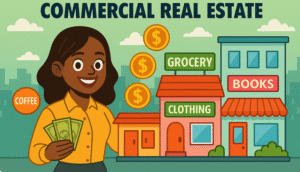Knowing how to make money from commercial real estate is one sure step towards generational wealth. It is like having a bucket that scoops non stop from the river of money. It moves in sync with a fundamental secret: sustainable wealth is not built on one-off wins, but on a foundation of predictable, recurring income. For these savvy investors, commercial real estate (CRE) stands as a powerful, time-tested engine for generating lasting prosperity.
While the idea of owning a “shop” or an “office block” is familiar, many potential investors do not fully grasp the immense potential that lies within this asset class. It is more than just owning property; it’s about owning a business that produces a steady stream of income, often with significant long-term appreciation. This article is your comprehensive guide to understanding, entering, and profiting from the world of commercial real estate in Nigeria.

How to Build Recurring Income with Commercial Real Estate in Nigeria
Understanding the Nigerian Commercial Real Estate Landscape
Commercial real estate is simply property used exclusively for business purposes. Unlike residential real estate, which provides a place to live, commercial real estate is a revenue-generating asset. In Nigeria, the CRE market is diverse and thriving, driven by our growing population, urbanization, and expanding business sector. The main categories include:
Retail Properties: This includes shopping malls (like Ikeja City Mall or The Palms in Lagos), neighborhood shopping plazas, and standalone retail stores. Their success is often tied to foot traffic and the purchasing power of the surrounding community.
Office Spaces: These range from high-rise corporate headquarters in Ikoyi, Victoria Island, and Abuja to smaller, well-located office blocks in emerging business districts like Lekki Phase 1 or GRA in Port Harcourt. The demand is fueled by local businesses, multinational corporations, and even the growing number of co-working spaces.
Industrial Properties: This is a booming sector that includes warehouses, distribution centers, and manufacturing facilities. With the rise of e-commerce and the need for improved logistics, strategically located warehouses along major transport routes (e.g., the Lagos-Ibadan Expressway) are in high demand.
Multifamily Residential (as a Commercial Venture): While people live here, owning an entire block of flats or an estate of apartments for the purpose of renting them out is a commercial enterprise. This is one of the most accessible entry points for many Nigerian investors.
Hospitality: Hotels, guest houses, and event centers and even shortlet apartments fall under this category. While highly lucrative, they are also management-intensive and sensitive to economic cycles.
How Commercial Properties Make You Money
The primary appeal of commercial real estate is its ability to generate multiple, consistent streams of income. Here’s how your investment puts money in your pocket:
Rental Income (The Core Recurring Revenue): This is the lifeblood of Commercial Real Estate. You lease your space to business tenants (retailers, corporate firms, etc.) who pay you rent, typically on a monthly or quarterly basis. The key advantage here is the nature of the lease agreements.
Longer Lease Terms: Unlike residential tenancies which might be yearly, commercial leases are often for 3, 5, 10, or even more years. Remember; most times these properties are rented by businesses, and they need stability. This provides incredible income stability and predictability, allowing you to plan your finances years in advance.
Tenants Pay Taxes: This is a common with the long leases; the technical term is “Triple Net Lease”. The tenant is responsible for paying not only the rent but also the three “nets”: Property Taxes, Building Insurance, and Maintenance Costs. This means the rental income you receive is almost entirely profit, with very few operational expenses deducted.
Capital Appreciation: Over time, and with proper management, the value of your commercial property is likely to increase. This appreciation is driven by factors like development in the area, inflation, increased demand for commercial space, and improvements you make to the property itself. When you decide to sell, this appreciation represents a significant lump-sum profit on top of all the rental income you’ve already collected.
Other Income Avenues: A well-managed property can generate additional revenue. This could include:
Service Charges: For office blocks or shopping plazas, you can charge tenants a separate fee for shared services like security, waste disposal, and common area maintenance.
Parking Fees: In high-demand areas, charging for parking can be a substantial income source.
Advertising Rights: Allowing brands to place billboards or signage on your building.

Maximizing Your Returns: A Strategic Playbook for the Nigerian Investor
Making money in Commercial Real Estate is one thing; maximizing it is an art. Here’s how to ensure you get the best possible return on your investment:
Location is Non-Negotiable: The old adage is doubly true in Nigeria. A Class A building in a poor location will underperform a Class B building in a prime area. Look for areas with growing infrastructure, easy accessibility, security, and a thriving business ecosystem. Research government development plans – being ahead of the curve can be highly profitable.
The Power of Professional Property Management: Do not make the mistake of thinking you can manage a commercial property alone. A professional property management company handles tenant sourcing, rent collection, maintenance, and dispute resolution. Their expertise ensures high occupancy rates, timely rent payments, and property preservation, which directly boosts your income and peace of mind.
Strategic Tenant Mix and Retention: For retail properties, your tenant mix is crucial. You want complementary businesses (e.g., a supermarket, a pharmacy, a bank) that drive foot traffic for each other. Furthermore, retaining a good tenant is cheaper and more profitable than constantly seeking new ones. Build strong relationships and be a responsive landlord.
Value-Add Opportunities: Look for properties that are underperforming or undervalued – often called “value-add” investments. This could be an older office block that needs refurbishment. By renovating the façade, upgrading the elevators, and modernizing the interiors, you can significantly increase its rental value and overall worth.
Leverage Debt Wisely: Using a bank loan or mortgage to finance part of your purchase can amplify your returns. This is known as leverage. If you put down 40% and borrow 60%, you control a 100% asset. When the property appreciates, your gain is calculated on the total value, not just your initial deposit, leading to a higher Return on Investment (ROI). However, this must be done cautiously, ensuring your rental income can comfortably cover the loan repayments.
Here is a simple overview:
| Feature | Commercial Real Estate | Residential Real Estate |
|---|---|---|
| Lease Length | Long-term (3–10+ years) | Short-term (1–2 years) |
| Income Stability | High, predictable cash flow | Less predictable, tenant turnover is higher |
| Tenant Relationship | Business-to-Business (B2B) | Business-to-Consumer (B2C) |
| Yield (Returns) | Generally higher (8%–15%+ in prime areas) | Generally lower (3%–6% in most Nigerian cities) |
| Management | More complex, often requires professionals | Can be managed by the owner, but can be stressful |
| Capital Outlay | Typically requires a larger initial investment | Lower entry point for a single unit |
Shine Your Eyes: What to Avoid When Investing in Commercial Real Estate
The path to recurring income is not without its potential traps. Being aware of these common mistakes can save you from significant financial loss:
Poor Due Diligence: Don’t pay money just because the agent wears a sharp suit or drives a flashy car. This is the number one killer of real estate investments. Never skip these steps:
Title Verification: Ensure the seller has a genuine Certificate of Occupancy (C of O) or Governor’s Consent and that the land is not subject to any government acquisition or family disputes. Engage a competent lawyer.
Technical Survey: Hire professionals to check the structural integrity of the building, the state of electrical systems, plumbing, etc.
Financial Analysis: Scrutinize existing tenant leases, payment history, and all operational expenses. Don’t just take the seller’s word for it.
Underestimating Total Costs: You must first make a budget, and your budget must go beyond the purchase price. Account for legal fees, agent commissions, stamp duties, and initial renovation costs. Also, for properties without a Triple Net Lease, budget meticulously for maintenance, repairs, and voids (periods when the property is empty).
Emotional Investing: Commercial real estate is a business decision, it is completely different from buying a residence which you can buy because “it resonates with you.” Do not fall in love with a beautiful building in a failing location. Nobody will rent your warehouse if the commercial hub has been demolished or if insecurity has driven the businesses away. Base your decisions on cold, hard numbers: the potential yield, occupancy rates, and the economic viability of the area.
Ignoring Vacancy Risk: Even in the best locations, properties can become vacant. A prudent investor always has a cash reserve – like 3 to 6 months of expenses – especially if he has loan repayments, taxes, and maintenance during void periods.
Going It Alone: The troubles and traps are too many – from land disputes to contract law. It is not advisable for one person to go alone. Instead, build a team of trusted professionals: a real estate lawyer, a reputable estate surveyor and valuer, a qualified engineer, and a proven property manager.
Getting Started: Your First Steps into Commercial Real Estate
If the capital requirement for a full building seems daunting, there are accessible entry points:
Real Estate Investment Trusts (REITs): REITs are still a new feature in the local real estate industry, but investigations reveal that they are becoming quite popular. They allow you to invest in a portfolio of commercial properties by buying units, similar to buying shares on the stock market. There are several examples, but we decline to mention names here. This offers liquidity, diversification, and availability even with small capital.
Syndication/Partnerships: Pool resources with other trusted investors to acquire a property you couldn’t afford individually. A good starting point is family, work mates, or old time friends. This must be done with a clear and legally binding partnership agreement.
Start Small: Consider buying a single shop in a well-located plaza or a small, purpose-built office unit. This allows you to learn the ropes with a manageable investment.
Conclusion:
In a nation brimming with potential, commercial real estate offers a tangible and powerful path to financial freedom. It is a vehicle that can provide a fortress of financial stability for you and a lasting legacy for your children. It transforms you from a passive income-seeker into an active wealth creator, providing a recurring income stream that can withstand economic fluctuations.
The journey requires capital, diligence, and strategic patience. But for those who are willing to learn the rules, assemble the right team, and make informed decisions, the reward is the ultimate prize: a self-sustaining wealth engine that works for you, month after month, year after year. Start your journey today. Your future self will thank you for it.



